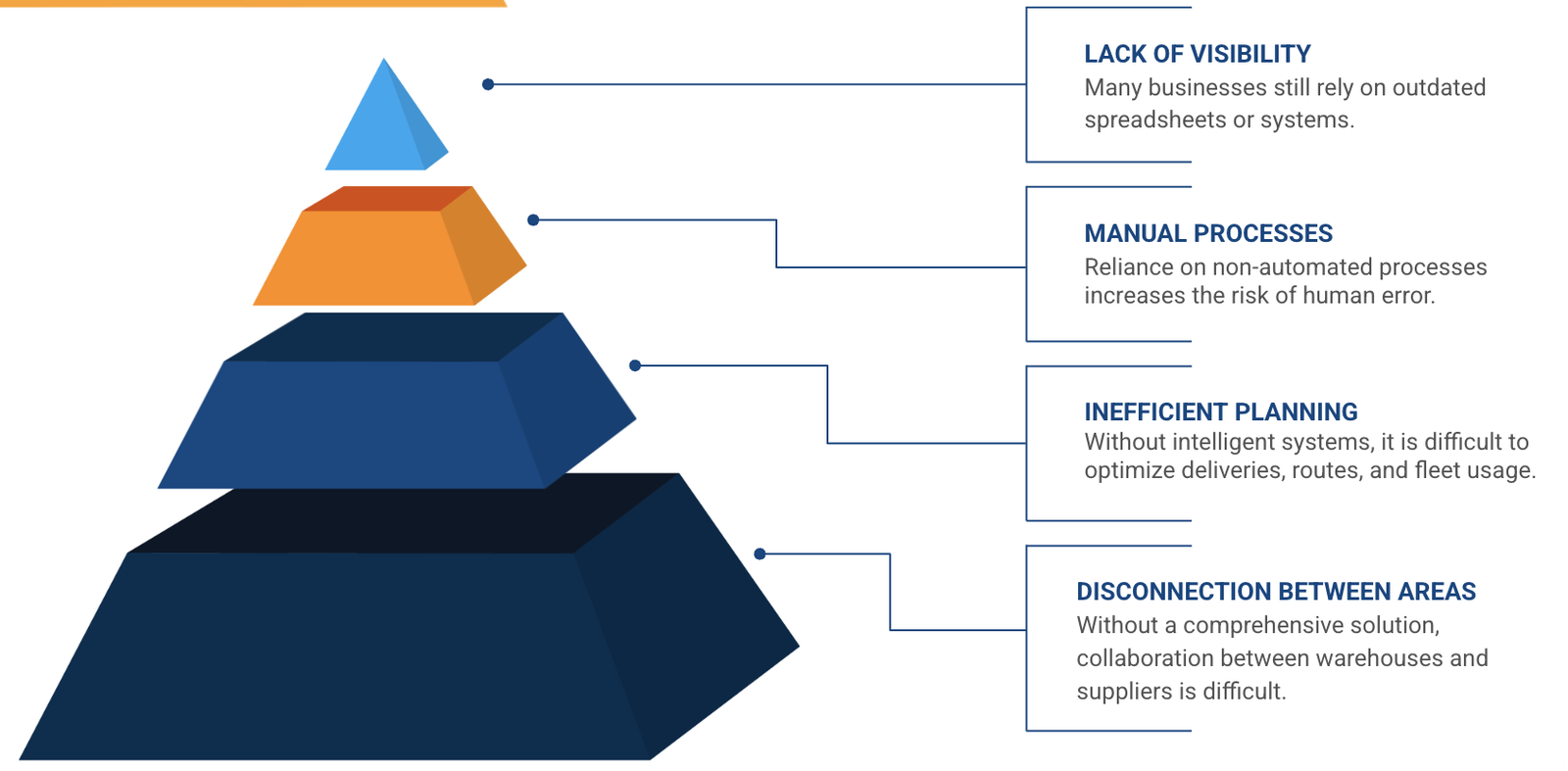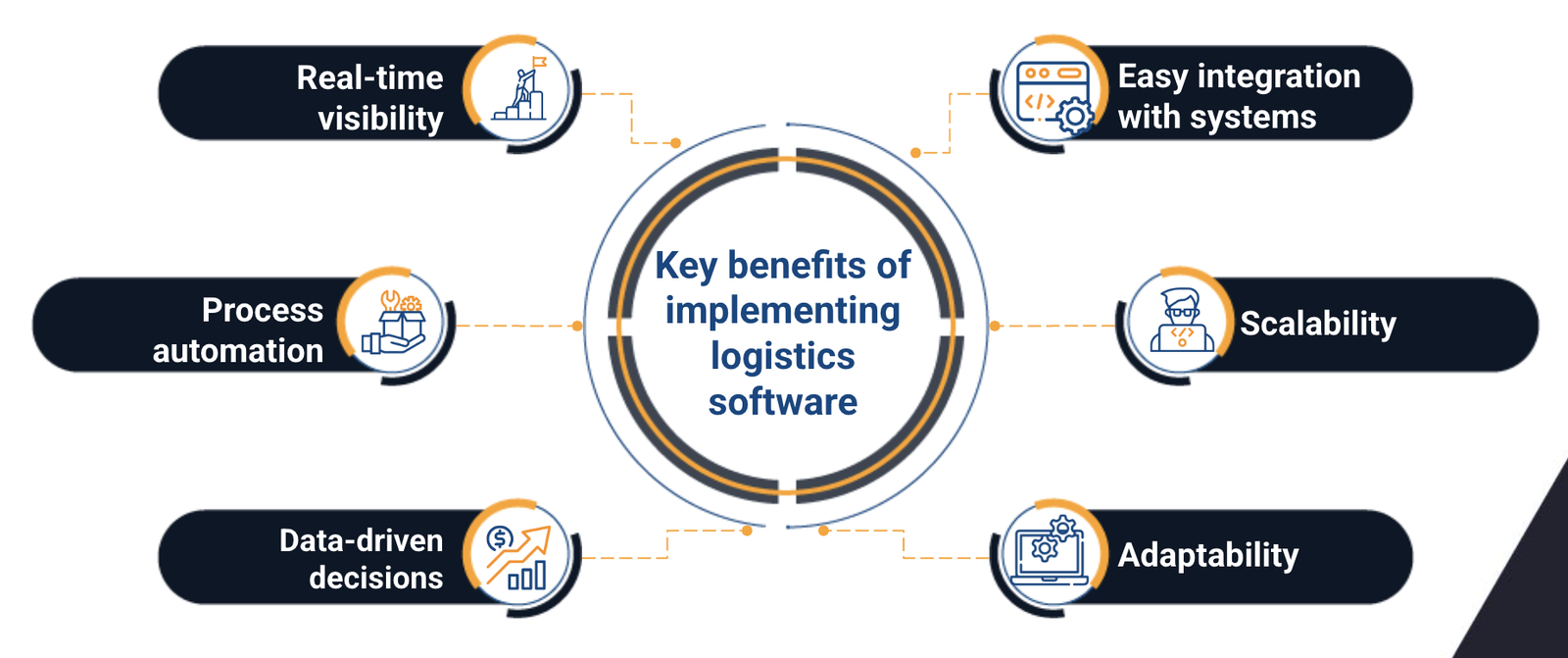
How logistics software development drives digital transformation in supply chains
Table of contents
Quick Access

For a long time, the transportation and logistics industry has been perceived as one of the lagging industries in terms of technology adoption. However, this reality has changed radically in recent years.
According to the 2023 Supply Chain Digital Transformation Enterprise Survey conducted by S&P Global Market Intelligence, “nearly two-thirds of organizations report having a digital transformation plan, and the remaining majority say they are considering one.”
This shift is driven by the urgent need to adapt to more complex, dynamic, and interconnected environments.
Logistics software development has become one of the fundamental pillars of this digital transformation. It's no longer about opting for generic systems, but rather for customized platforms and solutions capable of automating processes, reducing human error, optimizing routes, and increasing end-to-end efficiency.

The sustained growth of digitalization in logistics
According to data from S&P Global, “67% of transportation and logistics companies report having a formal digital transformation strategy to actively digitize their business processes. Nearly 31% say they are considering or evaluating such a plan. Only 3% report not having a digital transformation strategy.”
This indicator shows that digitalization is no longer an option, but an inevitable path to staying competitive.
In this context, many companies are turning to a logistics software development company to design tailored solutions that respond to the specific challenges of their operations: from inventory management across multiple warehouses to real-time synchronization with suppliers and customers.
Technological momentum supported by strategic investments
Interest in advanced digital solutions has grown even in uncertain economic environments.
A report from McKinsey indicates that “approximately 87% of shippers reported maintaining or increasing their technology investments since 2020, and 93% stated they plan to maintain or increase their investment over the next three years.” This commitment to innovation reflects not only an operational need but also a strategic vision to build more resilient and agile supply chains.
The report adds that “the survey shows that both shippers and suppliers are moving beyond basic technology and turning to cutting-edge solutions to gain or maintain a competitive advantage.”
This trend reinforces the critical role of logistics software development as a key enabler of transformation.

Common problems solved by logistics software development
Business leaders who have not yet embarked on a digital path may be facing several pain points that logistics software development can effectively address:
- Lack of Real-Time Visibility: Many businesses still rely on spreadsheets or outdated systems to track their operations, leading to delays and a lack of control.
- Manual and Error-Prone Processes: The dependenceThe lack of automated processes increases the risk of human error, merchandise loss, and cost overruns.
- Inefficiencies in route and resource planning: Without intelligent systems, it is difficult to optimize deliveries, routes, and fleet utilization.
- Disconnection between internal areas and external partners: Without a comprehensive solution, collaboration between warehouses, suppliers, carriers, and customers is difficult.
By turning to a logistics software development company, organizations can adapt technological tools according to their needs and gain a competitive advantage that directly impacts their profitability.

Key benefits of implementing specialized logistics software
Adopting customized solutions through the development of logistics software not only solves immediate problems but also opens up new opportunities for improvement and sustained growth:
- Total Real-Time Visibility: Modern solutions allow constant monitoring of the flow of goods, from origin to final destination, with customized dashboards, smart alerts, and traceability via GPS or IoT sensors.
- Process Automation: From load scheduling and vehicle assignment to automatic invoicing and delivery validation, specialized software can automate multiple operational and administrative functions.
- Data-Driven Decision-Making: With integrated advanced analytics, leaders can make informed decisions, anticipate bottlenecks, optimize resources, and predict demand trends.
- Seamless integration with existing systems: A good logistics software development company can create platforms that integrate with existing ERP, CRM, TMS, or WMS systems, reducing implementation costs and ensuring operational continuity.
- Scalability and adaptability: As the company grows, the software adapts. Custom solutions can be scalable for multiple locations, transportation modes, languages, and currencies, which is essential for international supply chains.

Advanced use cases that are gaining traction
According to McKinsey, “numerous companies are already testing advanced use cases.” These include artificial intelligence for demand forecasting, blockchain for secure product traceability, autonomous vehicles for internal transport, and predictive analytics for fleet maintenance.
All of these advances require the support of a robust technological ecosystem, which can be developed with the help of a logistics software development company with experience in innovative solutions.
Choosing the right technology partner for logistics software development
For digital transformation to have a real impact, it is crucial to choose a strategic partner that understands the specifics of the logistics sector. A logistics software development company must have proven experience, agile methodologies, in-depth knowledge of the logistics business, and the ability to integrate with other emerging technologies.
This type of collaboration not only guarantees efficient technical results but also a strategic vision aligned with business objectives.
Conclusion: Digitization is not an option, it is an imperative
The time to invest in technology is now. Evidence from both S&P Global and McKinsey shows that digital transformation is no longer a future trend, but a present reality that is shaping the rules of the game in global logistics.
The logistics software industry is presented as the most powerful accelerator for evolving from rigid, analog operating models to intelligent, connected, and data-driven supply chains.
Companies that take the lead, with the help of a logistics software development company, will be better positioned to face market challenges, gain efficiency, and offer better service to their customers.
In this context, Rootstack positions itself as a reliable and experienced provider in the development of customized technological solutions for the logistics sector.
With a results-focused approach, agile methodologies, and a highly skilled team, Rootstack has helped numerous companies transform their supply chains through innovative and scalable digital tools.